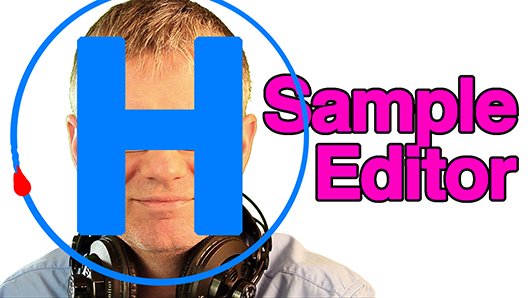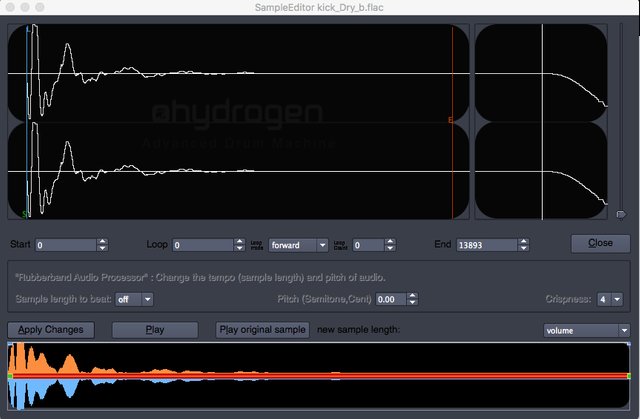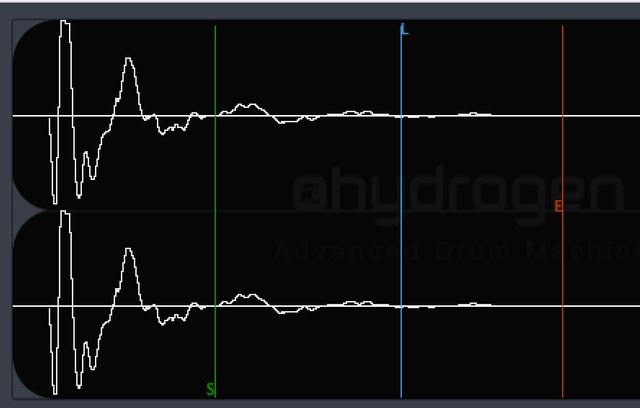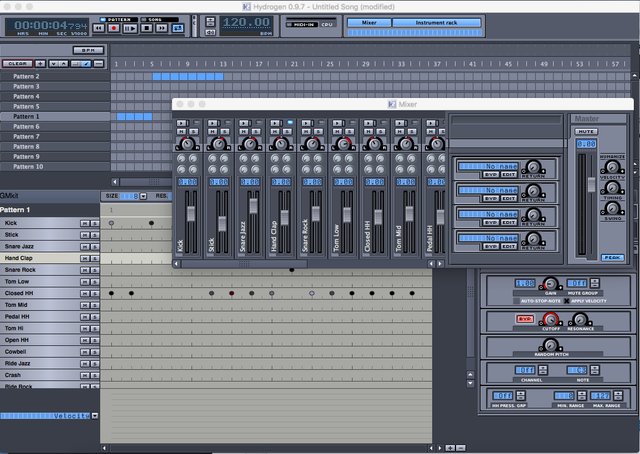Hydrogen Drum Machine - Sample Editor
What Will I Learn?
- You will learn the functionality of the Sample Editor.
- You will learn how to change the start, end and loop points of a sample.
- You will learn how to use the looping effect.
- You will learn how to alter the volume graph and pan in the Sample Editor.

Requirements
To complete this tutorial learners will need to have the following:
- The software application Hydrogen installed
Difficulty
This tutorial is at an Expert level. It is strongly advised that learners complete the previous tutorials in this series before attempting this tutorial.
Description
How to set the start, stop and loop markers within the Sample Editor
You can find the Sample Editor by clicking Edit Layer in the Instrument Editor window.

Once in the Sample Editor window there are a lot of tools to help you fine tune your samples.

At the top oft he window you will see the waveform of the sample. On this you will see three vertical lines - red, blue, green. These lines indicate the end of the sample, the beginning and the loop point. You can move these around by grabbing the letter on each of the lines.

NOTE: When you make a change to your sample you will need to click Apply Changes in order to hear your changes. All the changes you make are 'non-destructive' so they do not effect the original sample.
In the video tutorial I how the lines can be used to alter your samples.
Creating a loop in a sample
The blue 'loop' line can be used to indicate where you would like a loop effect to start within your sample. I demonstrate this in the video so I suggest you have a look at that for a clear example of how it works.
When looping you have some options. In the pull-down menu in the middle of the window you can choose Forward, Reverse and PingPong. These will give you unique options in how the loop feature functions.

How to use the Volume and Panorama function
At the bottom of the Sample Editor you are given a tool for editing volume and pan (balance) of your sample. Using the line graph for each you can alter these parameters for the duration of the time the sample plays. They can be very useful for creating unique samples for your drum patterns. I demonstrate how this can be used in the tutorial video.


Hydrogen is an open source application, which means that it is free for everyone to use. Please consider going to the developers' website and show your support for the project - http://www.hydrogen-music.org/
I hope you enjoy this tutorial. If you have any specific questions for me feel free to leave it in the comments of this post and I will do my best to get back to you with an answer.
Cheers,
@buckydurddle
Video Tutorial
Curriculum
Learn Hydrogen Drum Machine Series
If you would like to learn how to use the open source drum machine Hydrogen, then have a look at these tutorials:
Hydrogen - UI Layout & Basics
Hydrogen - Rhythmic Resolution
Hydrogen - Effective Beat Making
Hydrogen - Song Editor, ADSR, Importing DrumKits from Respositories
Hydrogen - Humanize (Velocity, Timing & Swing)
Hydrogen - New Instruments, Loading Samples & Multiple Sample Sounds
Hydrogen - Beat Counter, BPM & Other Tempo Tools
Learn Helm Series

If you would like to learn how to use the open source software synth Helm, then have a look at these tutorials:
Helm 1st Oscillator Video Tutorial
Helm 2nd Oscillator Video Tutorial
Learn Audacity Series

If you would like to learn how to use the open source sound recording and editing software Audacity then have a look at these tutorials:
1 How to Create a New Audacity Project
2 How to Open or Import Audio Files in Audacity
5 How to Save an Audacity Project
7 How to Set Input Volume Levels
8 How to Export MP3 and WAV Files
9 How to Select and Delete Sound
ACTIVITY 1 - My First Recording
10 How to use Undo and History in Audacity
12 How to Use the Time Shift Tool
13 How to Use the Change Pitch Effect
ACTIVITY 2 - Make Your Voice Sound Like a Chipmunk
14 How to Use the Fade In & Fade Out Effects
15 How to Download Sound Samples from the Internet
16 How to Use the Amplify Effect
ACTIVITY 3 - Multitrack Recording in Audacity - Beatbox
21 How to Use the Change Tempo Effect
22 How to Use the Equalization Effect
ACTIVITY 4 - How to Mess Up a Piece of Music
25 How to Remove Vocals from a Recording
SETUP - How to Install the LAME Encoder
Logo - http://tytel.org/helm
Logo - https://www.audacityteam.org/
Logo - http://www.hydrogen-music.org/hcms/
Posted on Utopian.io - Rewarding Open Source Contributors

Thank you for the contribution. It has been approved.
You can contact us on Discord.
[utopian-moderator]
Thanks @ewq :)
Very nice to be doing a post you thank you for sharing a nice post in us